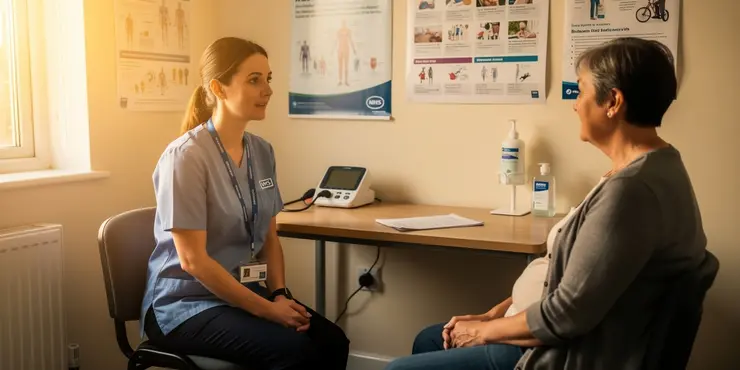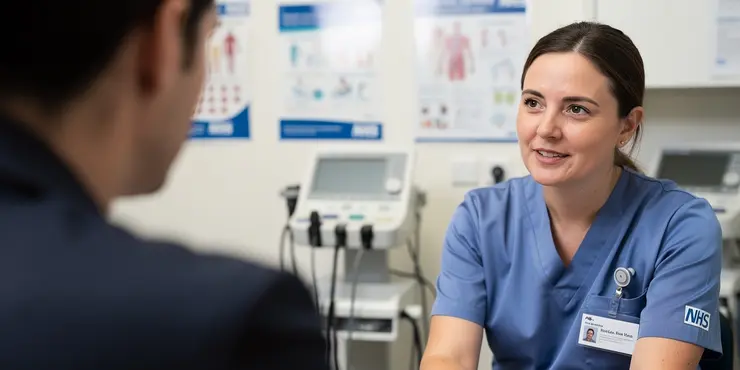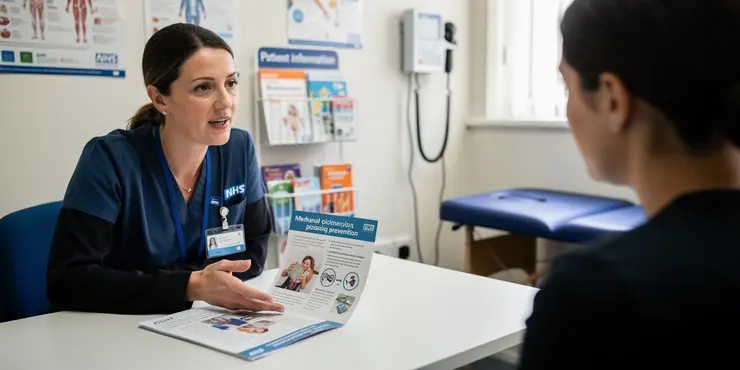Find Help
More Items From Ergsy search
-

FASD Foetal alcohol
Relevance: 100%
-

Living with Foetal Alcohol Spectrum Disorder (FASD), a mum’s journey (full version)
Relevance: 80%
-
What is alcohol poisoning?
Relevance: 25%
-

Alcohol Awarerness Week
Relevance: 25%
-

5 Facts about Alcohol and Britain
Relevance: 24%
-

What is safe alcohol consumption in Adults?
Relevance: 23%
-

Should I avoid alcohol during a heatwave?
Relevance: 23%
-

Can alcohol worsen sleep apnea?
Relevance: 23%
-

Is it possible for alcohol alone to cause similar symptoms?
Relevance: 22%
-
Can alcohol be consumed while taking Wegovy?
Relevance: 22%
-
How does alcohol tolerance relate to binge drinking?
Relevance: 21%
-
Why is methanol sometimes found in illegally produced alcohol?
Relevance: 21%
-

What is Alcohol Rehab?
Relevance: 21%
-

What role does alcohol consumption play in bowel cancer risk?
Relevance: 20%
-

Why might a Caesarean birth be necessary?
Relevance: 14%
-

Can pregnant women take Baxdrostat?
Relevance: 11%
-

Can binge drinking affect physical health?
Relevance: 10%
-

Can binge drinking lead to addiction?
Relevance: 9%
-

Why is there concern about paracetamol and autism?
Relevance: 9%
-

How can one reduce the risk of binge drinking?
Relevance: 9%
-

What are the differences between methanol and ethanol?
Relevance: 8%
-

Alcohol-Related Deaths in Scotland
Relevance: 8%
-

How does driving under the influence relate to dangerous driving?
Relevance: 8%
-

How is binge drinking typically defined?
Relevance: 8%
-

Are there cultural factors in binge drinking?
Relevance: 8%
-
Why is binge drinking common among young adults?
Relevance: 8%
-

What resources are available for someone struggling with binge drinking?
Relevance: 8%
-

What are the risks associated with binge drinking?
Relevance: 8%
-

What is binge drinking?
Relevance: 8%
-
How does binge drinking affect mental health?
Relevance: 8%
-

What is fomepizole and how does it work?
Relevance: 8%
-

Liver disease | NHS
Relevance: 8%
-

How can methanol poisoning be prevented?
Relevance: 7%
-

How does methanol poisoning differ from ethanol poisoning?
Relevance: 7%
-

What is methanol poisoning?
Relevance: 7%
-

How quickly do symptoms appear after a drink has been spiked?
Relevance: 7%
-

How does binge drinking affect the brain?
Relevance: 7%
-

Is binge drinking more common in any specific demographic?
Relevance: 7%
-

How does exercise benefit pregnancy?
Relevance: 7%
-

Can I taste or smell if my drink has been spiked?
Relevance: 7%
Understanding Foetal Alcohol Spectrum Disorders (FASD)
What is FASD?
Foetal Alcohol Spectrum Disorders (FASD) is a term that describes a range of physical, behavioural, and cognitive disabilities that can occur in individuals whose mothers consumed alcohol during pregnancy. FASD encompasses several conditions, including Foetal Alcohol Syndrome (FAS), Partial Foetal Alcohol Syndrome (PFAS), Alcohol-Related Neurodevelopmental Disorder (ARND), and Alcohol-Related Birth Defects (ARBD).
Causes of FASD
FASD is caused by the consumption of alcohol during pregnancy. When a pregnant woman drinks alcohol, it crosses the placenta and can interfere with the development of the baby's brain and other organs. There is no known safe amount of alcohol use during pregnancy; therefore, abstaining from alcohol is the best way to prevent FASD. In the United Kingdom, public health guidelines strongly recommend that pregnant women avoid alcohol altogether.
Symptoms and Diagnosis
The symptoms of FASD can vary widely but may include facial anomalies, growth deficiencies, and central nervous system problems leading to intellectual disabilities, behavioural issues, and learning difficulties. Diagnosing FASD can be challenging due to the spectrum of symptoms and the overlap with other developmental disorders. Typically, a multidisciplinary team of healthcare providers, including paediatricians, psychologists, and occupational therapists, is involved in the diagnostic process.
Prevalence and Awareness in the UK
FASD is a significant public health concern in the United Kingdom. Although exact prevalence rates are hard to determine due to underreporting and diagnostic challenges, it is estimated that FASD affects approximately 1% of the population. Raising awareness about the risks associated with alcohol consumption during pregnancy is crucial. Various organisations and campaigns are working to educate the public and healthcare professionals about FASD and its prevention.
Support and Intervention
While there is no cure for FASD, early intervention and supportive care can help individuals manage their symptoms and improve their quality of life. In the UK, support services may include educational interventions, behavioural therapies, and family support programmes. Resources such as the National Organisation for Foetal Alcohol Spectrum Disorder (NOFAS-UK) provide vital information and support for affected families and individuals.
Understanding Foetal Alcohol Spectrum Disorders (FASD)
What is FASD?
Foetal Alcohol Spectrum Disorders (FASD) is a group of problems in the body or brain. These problems can happen if a baby's mother drinks alcohol while she is pregnant. FASD includes different conditions like Foetal Alcohol Syndrome (FAS), and other related disorders.
Causes of FASD
FASD happens because a pregnant woman drinks alcohol. Alcohol can harm the baby's brain and body. No amount of alcohol is safe when you are pregnant. The best way to stop FASD is not to drink any alcohol if you are expecting a baby. In the UK, health experts say pregnant women should not drink alcohol at all.
Symptoms and Diagnosis
FASD can look different in each person. Some signs include unusual facial features, being smaller than other children, and having trouble learning or behaving. It can be hard for doctors to tell if someone has FASD because it can look like other disorders. Usually, different healthcare experts work together to figure it out.
Prevalence and Awareness in the UK
FASD is a big concern in the UK. It's tough to know exactly how many people have FASD, but experts think about 1 in 100 people might be affected. It's important for people to know that drinking alcohol during pregnancy can cause FASD. Many groups work to teach people and healthcare workers about FASD and how to prevent it.
Support and Intervention
FASD cannot be cured, but help can make life better for those affected. In the UK, support might include special teaching, therapies to help with behavior, and programs to help families. Groups like the National Organisation for Foetal Alcohol Spectrum Disorder (NOFAS-UK) give important information and support to people and families dealing with FASD.
Frequently Asked Questions
What is Foetal Alcohol Spectrum Disorder (FASD)?
FASD refers to a range of physical, behavioural, and cognitive disabilities that can occur in individuals who were exposed to alcohol before birth.
How common is FASD in the United Kingdom?
It's estimated that 3-5% of people in the UK may be affected by FASD, but actual numbers could be higher due to underdiagnosis.
What are the symptoms of FASD?
Symptoms can include growth deficiencies, facial anomalies, learning difficulties, poor motor skills, and behavioural issues such as hyperactivity and impulsiveness.
How is FASD diagnosed?
Diagnosis typically involves a thorough medical history, a physical examination, and an assessment of cognitive and behavioural functions. A multidisciplinary team often conducts the evaluation.
Can FASD be prevented?
Yes, FASD is 100% preventable by abstaining from alcohol during pregnancy.
What should I do if I think my child has FASD?
Consult your GP or paediatrician. They may refer you to specialists for further evaluation and diagnosis.
Is there a cure for FASD?
There is no cure, but early intervention and support can significantly improve outcomes for individuals with FASD.
Can fathers' alcohol consumption affect the baby?
While FASD is directly caused by maternal alcohol consumption during pregnancy, paternal drinking habits can contribute to a range of factors affecting a baby’s overall health, though more research is needed in this area.
Are there specific treatments for FASD?
Treatments are individualized and may include educational support, behavioural therapies, and medical care for associated health issues.
Can adults be diagnosed with FASD?
Yes, adults can be diagnosed with FASD, although it is more challenging and less common. Diagnosis often relies on personal history and symptom assessment.
How can schools support children with FASD?
Schools can provide tailored educational plans, behavioural interventions, and mental health support to help these children thrive academically and socially.
Are there support groups for families affected by FASD in the UK?
Yes, there are several organisations and support groups dedicated to helping families affected by FASD. Examples include FASD Network UK and NOFAS-UK.
How does FASD affect learning and development?
FASD can lead to difficulties with memory, attention, problem-solving, and social interactions, all of which can impact learning and development.
Can people with FASD lead independent lives?
With appropriate support and intervention, many individuals with FASD can lead productive and independent lives. However, some may need ongoing assistance.
What role do healthcare providers play in managing FASD?
Healthcare providers play a crucial role in early diagnosis, intervention, and providing ongoing medical and psychological support for individuals with FASD and their families.
What is Foetal Alcohol Spectrum Disorder (FASD)?
FASD happens when a baby grows in a mother's tummy and she drinks alcohol. This can make it hard for the baby to learn and grow later. FASD can cause problems with how the child thinks and acts. It is important for mums-to-be not to drink alcohol.
To help understand more, use pictures or simple videos. You can also talk to a doctor or a friendly nurse if you have questions.
FASD means a group of problems that can happen to people if they drank alcohol before they were born. These problems can be with the body, how someone acts, or how they think.
Here are some ways to help understand:
- Use pictures to help explain things.
- Break information into small steps.
- Ask someone for help if you need it.
How many people have FASD in the United Kingdom?
FASD means Fetal Alcohol Spectrum Disorder. It happens when a baby is hurt because their mother drank alcohol when pregnant.
In the United Kingdom, lots of people have FASD. Some people think 3 to 5 out of every 100 people might have it. This is an estimate because it is hard to know the exact number.
If you want to know more about FASD, you can:
- Talk to a doctor or nurse.
- Look at trusted websites about health.
- Ask for help to read about FASD.
Experts think that 3 to 5 out of every 100 people in the UK might have FASD. But, there might be more people because some cases are not spotted.
What are the signs of FASD?
FASD stands for Fetal Alcohol Spectrum Disorder. It happens when a baby is affected by alcohol before being born. Here are some signs:
- Problems with learning and memory
- Being smaller than other kids
- Having trouble paying attention
- Having a hard time making friends
- Finding it difficult to follow rules or instructions
If you think someone has FASD, it can help to talk to a doctor. For learning and remembering things, you can try using pictures or making a list. These can help make things clearer.
Signs can be:
- Not growing as expected
- Unusual facial features
- Trouble learning
- Problems with moving and balance
- Acting without thinking
- Being very active all the time
Tools that can help:
- Pictures to help understand
- Talking with a helper or teacher
- Using simple words
How do doctors know if someone has FASD?
Doctors play a big role in figuring out if someone has FASD. FASD happens when a baby’s mom drinks alcohol while she is pregnant. Alcohol can hurt the baby’s brain and body.
Here is how doctors find out if someone has FASD:
- Talk with the person and their family: Doctors ask questions about the person's life, health, and how they learn and behave.
- Look for signs: Doctors look for certain signs in the person’s body and behavior that are usual for FASD.
- Use special tests: Tests help see how the person’s brain works, like memory and problem-solving tests.
Helpful Tips:
- Bring a family member or friend to talk with the doctor. They can help remember what the doctor says.
- It’s okay to ask the doctor questions if something is hard to understand.
- Using a notebook to write down important information can help.
To find out what is wrong, doctors will:
- Ask about your health and past illnesses.
- Check your body to see how it is working.
- See how you think and behave.
A group of different health experts usually works together to help find out what is wrong.
Can we stop FASD from happening?
FASD stands for Fetal Alcohol Spectrum Disorders. It means health problems for a baby if a mom drinks alcohol when she is pregnant.
To stop FASD, it is important for moms not to drink any alcohol when they are going to have a baby.
Some ways to help include:
- Talking to a doctor before and during pregnancy.
- Asking family and friends for support to stop drinking alcohol.
- Going to classes or groups that help people avoid alcohol.
Using apps or reminders to help remember not to drink can also be useful.
Remember, it's okay to ask for help to stay healthy during pregnancy.
Yes, you can stop FASD by not drinking alcohol while you are pregnant.
What to do if you think your child has FASD?
If you think your child might have FASD, talk to a doctor. They can help you. FASD means Fetal Alcohol Spectrum Disorder.
Here are some steps you can take:
- Write down what you see. This means any signs or behaviors that worry you.
- Tell the doctor about these signs. This helps them understand your child better.
You can also:
- Look for support groups. They are places where you can talk to other parents.
- Use tools like simple charts. These can help you track your child’s progress.
- Find books or videos about FASD. They can give you more information.
Talk to your doctor or child's doctor. They might send you to other special doctors to help find out more.
Can FASD be fixed?
FASD means Fetal Alcohol Spectrum Disorders. It happens when a baby is affected by alcohol before being born.
There is no cure to make FASD go away completely. But, there are ways to help someone with FASD feel better.
Here are some tips:
- Teachers and Parents: Be patient and kind. Use simple words and pictures.
- Routine: Keep a regular daily schedule. Doing things in order helps.
- Therapy: Speech or occupational therapy can be helpful.
- Healthy Habits: Eat well, sleep enough, and exercise.
- Support Groups: Talk with others who know about FASD.
If you need more help, you can talk to a doctor or a teacher.
There is no way to make FASD go away, but getting help early can make things a lot better for people with FASD.
Can a dad's drinking harm the baby?
FASD happens when the mother drinks alcohol while she is pregnant. But if the father drinks too, it can still affect the baby. Scientists need to study this more.
What treatments can help with FASD?
There are different ways to help people with FASD. Here are some things that might help:
- Doctors: Visit a doctor for advice and check-ups.
- Therapists: Work with therapists who can help with learning and behavior.
- Schools: Ask teachers for special support in school.
- Parents: Parents can learn ways to help their children at home.
- Friends: Friends and family can give support and encouragement.
Using pictures and simple words can also help understand better. Try using apps or tools that make reading easier.
Treatments are different for each person. They might include help with learning, talking therapies to help with behavior, and doctor care for other health problems.
Can grown-ups find out if they have FASD?
Yes, grown-ups can learn if they have FASD (Fetal Alcohol Spectrum Disorder). It is important to talk to a doctor who knows about FASD.
Some people find it helpful to bring a friend or family member for support during the appointment.
Writing down questions before seeing the doctor can also help. This makes it easier to remember what to ask.
Yes, doctors can find out if adults have FASD. But it can be harder and does not happen as much. Doctors look at their life history and check their symptoms to find out.
If someone finds reading difficult, they can use tools that read text out loud. Listening to information can help them understand better.
How can schools help children with FASD?
FASD stands for Fetal Alcohol Spectrum Disorder. Children with FASD may find it hard to learn and focus.
Here are some ways schools can help:
- Give clear and simple instructions.
- Be patient and give extra time to finish work.
- Use pictures and visual aids to help explain things.
- Have a quiet space for children to calm down if they feel upset.
- Work with parents and carers to understand the child's needs.
- Use games and fun activities to help with learning.
Teachers and helpers can also learn more about FASD. Knowing more can help them give the best support.
Schools can make special learning plans for each child. They can also help children behave well and feel good in their minds, so they can do well in school and get along with others.
Can families in the UK get help if they are affected by FASD?
Families in the UK can find groups that help with FASD. FASD means Fetal Alcohol Spectrum Disorders. These groups are places where people can meet and talk about their feelings. Families can share tips and get help.
Sometimes, there are meetings you can go to. You can also find help online. There are videos and websites that can give more information.
Families can also talk to doctors and teachers who understand FASD. They can give advice on how to support children with FASD.
Yes, there are groups that help families with FASD. Some examples are FASD Network UK and NOFAS-UK.
How does FASD change how someone learns and grows?
FASD can make it harder for kids to learn and grow. It can change how they think, learn new things, and understand their feelings. Here are some ways FASD can affect learning and development:
- Learning: Kids with FASD may need extra help in school. They might find reading, writing, or math harder. Using picture books and videos can help them understand better.
- Understanding Feelings: They may find it hard to know how they or others feel. Talking about feelings with parents or teachers can help.
- Focusing: Focusing on one thing at a time might be difficult. Taking breaks during tasks can make it easier for them to stay on track.
- Memory: Remembering things might be a challenge. Using notes or checklists can help them remember what to do.
It’s important to be patient and give lots of support. Tools like calendars, reminders, and apps can help them keep track of their tasks.
FASD can make it hard to remember things, pay attention, solve problems, and talk to other people. This can make learning and growing up harder.
Here are some things that might help:
1. Use pictures to show what you mean.
2. Break big tasks into smaller, easy steps.
3. Repeat important information to help remember it.
Can people with FASD live on their own?
FASD means Fetal Alcohol Spectrum Disorder. It happens when a baby is exposed to alcohol before being born. This can make learning and doing some things harder.
Some people with FASD can learn to live on their own. They might need extra help and practice.
Support tools like having a planner or a helper can make it easier. Learning life skills slowly and getting advice from family and friends is also important.
Everyone is different, so the support needed can be different too. It's important to be patient and find what works best for each person.
With the right help, many people with FASD can have good and independent lives. Some might need help for a long time.
How do doctors and nurses help with FASD?
Doctors and nurses are here to help people with FASD. They can do many things to make life better. They find out if someone has FASD. They give medicine and set up special help, like classes. They talk to families to help them understand FASD. Doctors and nurses work with teachers and helpers too. It’s important to see doctors and nurses to get the best help. Using pictures can help understand more. Special apps can read text out loud.Doctors and nurses help a lot. They find out if someone has FASD early. They help people and their families by giving treatments and support. They also help with feelings and being healthy.
Useful Links
This website offers general information and is not a substitute for professional advice.
Always seek guidance from qualified professionals.
If you have any medical concerns or need urgent help, contact a healthcare professional or emergency services immediately.
Some of this content was generated with AI assistance. We’ve done our best to keep it accurate, helpful, and human-friendly.
- Ergsy carfully checks the information in the videos we provide here.
- Videos shown by Youtube after a video has completed, have NOT been reviewed by ERGSY.
- To view, click the arrow in centre of video.
- Most of the videos you find here will have subtitles and/or closed captions available.
- You may need to turn these on, and choose your preferred language.
- Go to the video you'd like to watch.
- If closed captions (CC) are available, settings will be visible on the bottom right of the video player.
- To turn on Captions, click settings .
- To turn off Captions, click settings again.
More Items From Ergsy search
-

FASD Foetal alcohol
Relevance: 100%
-

Living with Foetal Alcohol Spectrum Disorder (FASD), a mum’s journey (full version)
Relevance: 80%
-
What is alcohol poisoning?
Relevance: 25%
-

Alcohol Awarerness Week
Relevance: 25%
-

5 Facts about Alcohol and Britain
Relevance: 24%
-

What is safe alcohol consumption in Adults?
Relevance: 23%
-

Should I avoid alcohol during a heatwave?
Relevance: 23%
-

Can alcohol worsen sleep apnea?
Relevance: 23%
-

Is it possible for alcohol alone to cause similar symptoms?
Relevance: 22%
-
Can alcohol be consumed while taking Wegovy?
Relevance: 22%
-
How does alcohol tolerance relate to binge drinking?
Relevance: 21%
-
Why is methanol sometimes found in illegally produced alcohol?
Relevance: 21%
-

What is Alcohol Rehab?
Relevance: 21%
-

What role does alcohol consumption play in bowel cancer risk?
Relevance: 20%
-

Why might a Caesarean birth be necessary?
Relevance: 14%
-

Can pregnant women take Baxdrostat?
Relevance: 11%
-

Can binge drinking affect physical health?
Relevance: 10%
-

Can binge drinking lead to addiction?
Relevance: 9%
-

Why is there concern about paracetamol and autism?
Relevance: 9%
-

How can one reduce the risk of binge drinking?
Relevance: 9%
-

What are the differences between methanol and ethanol?
Relevance: 8%
-

Alcohol-Related Deaths in Scotland
Relevance: 8%
-

How does driving under the influence relate to dangerous driving?
Relevance: 8%
-

How is binge drinking typically defined?
Relevance: 8%
-

Are there cultural factors in binge drinking?
Relevance: 8%
-
Why is binge drinking common among young adults?
Relevance: 8%
-

What resources are available for someone struggling with binge drinking?
Relevance: 8%
-

What are the risks associated with binge drinking?
Relevance: 8%
-

What is binge drinking?
Relevance: 8%
-
How does binge drinking affect mental health?
Relevance: 8%
-

What is fomepizole and how does it work?
Relevance: 8%
-

Liver disease | NHS
Relevance: 8%
-

How can methanol poisoning be prevented?
Relevance: 7%
-

How does methanol poisoning differ from ethanol poisoning?
Relevance: 7%
-

What is methanol poisoning?
Relevance: 7%
-

How quickly do symptoms appear after a drink has been spiked?
Relevance: 7%
-

How does binge drinking affect the brain?
Relevance: 7%
-

Is binge drinking more common in any specific demographic?
Relevance: 7%
-

How does exercise benefit pregnancy?
Relevance: 7%
-

Can I taste or smell if my drink has been spiked?
Relevance: 7%


